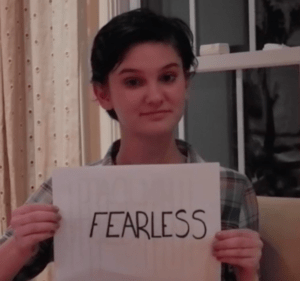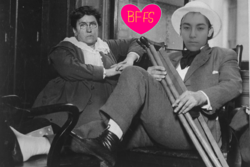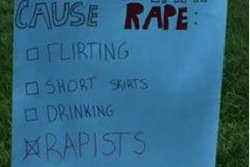Dear Midge Decter
Dear Midge Decter,
You know the saying: keep your friends close and your enemies closer. Were we to meet, we wouldn’t be enemies exactly, but I doubt that we’d be friends either. While you and I are both female Jewish writers, the similarity stops there. You’re most well-known for your vehement “neoconservative” opposition to the second-wave feminist movement and liberal childraising— two things that are absolutely intrinsic to my identity. I often choose to take an iconoclastic standpoint in discussions, and this, I believe, you would admire. After all, your fame grew on the back of ardent contradiction to the rapidly expanding social movements of the 1970’s. On the other hand, I think you would be absolutely horrified by me and by the life I lead. I’m a committed feminist and LGBTQ+ advocate, and I am the child of a liberal household; these are all things that you railed against in writing at the peak of your career. Furthermore, I’m a part of the American youth, whom you collectively chastised in your essay, A Letter to the Youths (And Their Parents). In this letter you upbraided us for our self-serving passion, for our attempts to unload responsibility on others, and for our desire to change the world. In your eyes, my generation, like every generation that’s come of age since the second wave of feminism and the sexual revolution, is apathetic, entitled, and inclined to complain rather than to act in the face of adversity.
What can I possibly say to this, Ms. Decter? How do I respond to your claim that nothing good has come of these movements, and of my generation? I have a few options. While it would be quite gratifying in the short run to simply dismiss you and your ideas, this course of action would just perpetuate your belief that young adults don’t handle differing views well (as laid out in A Letter to the Youths). More importantly, though, outright rejecting you would reflect a very one-sided approach to life and to human interaction. The people who surround me on a regular basis are very much like me ideologically, and I worry about that homogeny breeding fear of other viewpoints.
I don’t find the idea of unconditionally accepting your views very appealing either. To take this path would be to surrender many of my most precious beliefs, not to mention abandon the spirit of defiance that is so central to both of us, albeit in completely different ways. While adopting your views would make me more similar to you and minimize conflict, it would make me no longer myself, but rather a copy of someone else.
So we’re left with the third option, trying to open up a dialogue between us by recognizing our differences. Make no mistake about it, this is incredibly hard considering that I vehemently oppose more than a few of your views. Your condescending ridicule of gay men in The Boys At the Beach sickens me; I am crestfallen at your analysis of American young adults in A Letter to the Youths; I am downright confused by your claim that feminists are nothing more than women who are afraid to grow up. On the contrary, I would argue that feminists are fighting to have the same opportunities as men to mature, rather than letting themselves be relegated to the perpetual adolescence of required chaperones and permission-givers. This was the reality for many women prior to Women’s Liberation. Additionally, are you yourself not indebted to feminism for enabling you to be taken seriously as a writer? It’s not difficult for me to envision a world without feminism in which you, despite all your fire and intellect, would have been instructed to not concern yourself with these deep societal questions. It seems strange to me that you can discount something that was (whether you like it or not) so integral to your success.
With regard to your criticism of today’s youth and our various faults, such as our dependency on technology, I’d like to remind you that perfection is unattainable. I’m not condoning these issues, but people make mistakes, especially young people who have less experience to draw on when making decisions. Haven’t some of the world’s greatest inventions come about through missteps, like chocolate chip cookies, or even conscious flouting of the rules, such as pants for women? Sure, many errors or new things tried are silly, prompting the older and wiser to roll their eyes, but don’t dismiss them as entirely worthless. Lastly, two integral parts of my identity are my young age and my activism. To buy into your ideas of an apathetic, misguided next generation would be to not believe in myself and my peers.
Taking all of this into account, I sometimes see your point about indifferent, self-centered young people. Heck, occasionally I’m one of them who’s just trying to get through the next class period, or wishing that I could read magazines instead of the news. It’s this odd mix of motivation and malaise that I spend a lot of time thinking about. Some days I want to save the world, and other days I have to focus on making sure that my shirt isn’t inside out or that I have my shoes tied. I do worry about the possibility of forgetting the rest of the world beyond my own corner of the universe, as you believe most of American young people have. Here lies the most compelling reason for us to enter into a dialogue, rather than to dismiss each other on sight. Though I may oppose you on most things, we can help each other keep our shared goal in mind, which is to promote a generation of self-sufficient, well-informed activists who have a real impact. You are decidedly untrusting of young people and their ability to do good, while I believe that we are the next architects of a better world.
In my lifetime, Ms. Decter, I hope to prove your suspicions about youth wrong, and I think you’d be happy if I did.
Sincerely,
Caroline
This piece was written as part of JWA’s Rising Voices Fellowship.







